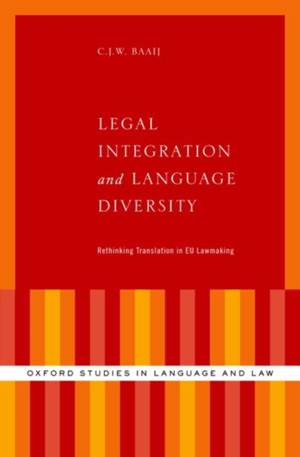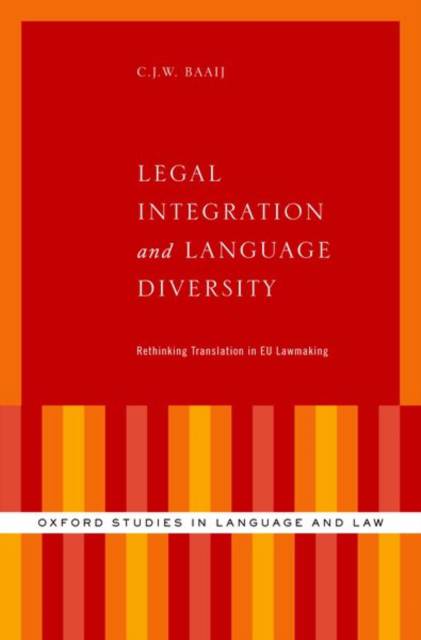
Bedankt voor het vertrouwen het afgelopen jaar! Om jou te bedanken bieden we GRATIS verzending (in België) aan op alles gedurende de hele maand januari.
- Afhalen na 1 uur in een winkel met voorraad
- In januari gratis thuislevering in België
- Ruim aanbod met 7 miljoen producten
Bedankt voor het vertrouwen het afgelopen jaar! Om jou te bedanken bieden we GRATIS verzending (in België) aan op alles gedurende de hele maand januari.
- Afhalen na 1 uur in een winkel met voorraad
- In januari gratis thuislevering in België
- Ruim aanbod met 7 miljoen producten
Zoeken
€ 174,95
+ 349 punten
Omschrijving
How can the European Union create laws that are uniform in a multitude of languages? Specifically, how can it attain both legal integration and language diversity simultaneously, without the latter compromising the former? C.J.W. Baaij argues that the answer lies in the domain of translation. A uniform interpretation and application of EU law begins with the ways in which translators and jurist-linguists of the EU legislative bodies translate the original legislative draft texts into the various language versions.
In the European Union, law and language are inherently connected. The EU pursues legal integration, i.e. the incremental harmonization and unification of its Member States' laws, for the purpose of reducing national regulatory differences between Member States. However, in its commitment to the diversity of European languages, its legislative institutions enact legislative instruments in 24 languages. Language Diversity and Legal Integration assesses these seemingly incompatible policy objectives and contemporary translation practices in the EU legislative procedure, and proposes an alternative, source-oriented approach that better serves EU policy objectives. Contrary to the orthodox view in academic literature and to the current policies of the EU, this book suggests that the English language version should serve as the original and only authentic legislative text. Translation into the other language versions should furthermore avoid prioritizing clarity and fluency over syntactic correspondence and employ neologisms for distinctly EU legal concepts.
Ultimately, Baaij provides practical solutions to the conflict between the equality of all language versions, and the need for uniform interpretation and application of EU law.
In the European Union, law and language are inherently connected. The EU pursues legal integration, i.e. the incremental harmonization and unification of its Member States' laws, for the purpose of reducing national regulatory differences between Member States. However, in its commitment to the diversity of European languages, its legislative institutions enact legislative instruments in 24 languages. Language Diversity and Legal Integration assesses these seemingly incompatible policy objectives and contemporary translation practices in the EU legislative procedure, and proposes an alternative, source-oriented approach that better serves EU policy objectives. Contrary to the orthodox view in academic literature and to the current policies of the EU, this book suggests that the English language version should serve as the original and only authentic legislative text. Translation into the other language versions should furthermore avoid prioritizing clarity and fluency over syntactic correspondence and employ neologisms for distinctly EU legal concepts.
Ultimately, Baaij provides practical solutions to the conflict between the equality of all language versions, and the need for uniform interpretation and application of EU law.
Specificaties
Betrokkenen
- Auteur(s):
- Uitgeverij:
Inhoud
- Aantal bladzijden:
- 312
- Taal:
- Engels
- Reeks:
Eigenschappen
- Productcode (EAN):
- 9780190680787
- Verschijningsdatum:
- 1/03/2018
- Uitvoering:
- Hardcover
- Formaat:
- Genaaid
- Afmetingen:
- 155 mm x 239 mm
- Gewicht:
- 589 g

Alleen bij Standaard Boekhandel
+ 349 punten op je klantenkaart van Standaard Boekhandel
Beoordelingen
We publiceren alleen reviews die voldoen aan de voorwaarden voor reviews. Bekijk onze voorwaarden voor reviews.









